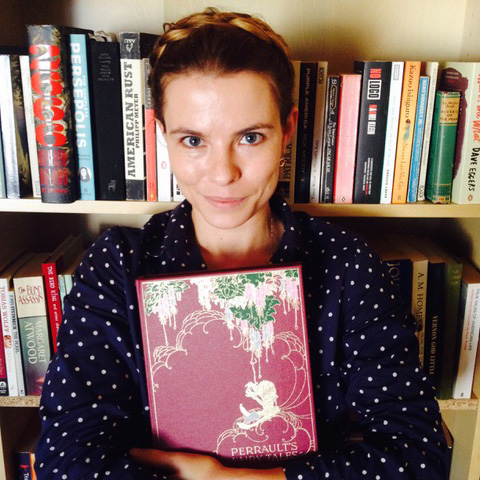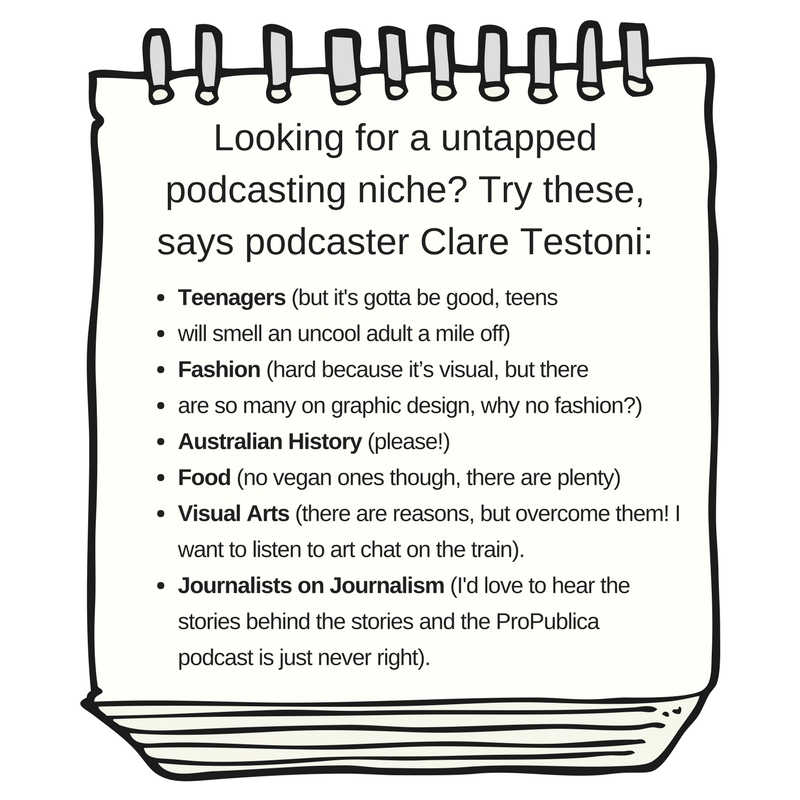

by Rachel Smith
02 June 2017
 Tell me about yourself and how you came to start a podcast.
Tell me about yourself and how you came to start a podcast.I’m a writer and I write for theatre mostly, but I also write fiction, and I’ve had a life long obsession with fairy tales, folk tales, and storytelling. Writing for performance as I do, there has always been an overlap for with radio, radio drama, and radio journalism. I fell in love with podcasts a few years ago. It’s oral storytelling at it’s best and there were so many links to what I love about performance, as well as folk tales and the art of telling a story. There were (and are) a few mythology podcasts out there but I wanted something smarter, smoother, something for people who had read a book once in their life before. I saw there was a gap in the market for the kind of podcast I wanted so I created Singing Bones.
Singing Bones looks at the history of fairy tales, it’s one part history, one part literature, and one part pop culture. I curate them into seasons of seven, and when I’m “in season” release them fortnightly. I’m just about to start my third season. I really need the time off in between to plan the new episodes, line up interviews, and get my day job done! Some podcaster I know release all year round weekly or fortnightly, but I just can’t do that and sleep. It definitely helps to build a following if you’re consistent.
It takes a while, it took about six months for me. You have to find your niche and find how that group gets their information. If you’re starting up something design-based you have to be on Instagram, you have to be on blogs. If your podcast is on books, get on Goodreads. It’s got to be content-driven and it’s about finding the people that want that content, and if you know your field really well you know where they are. Comment on boards, let people know you’re out there.
Twitter has always been really great for me, it good for the nerdy and literary people, and #folklorethursday really helped me get started (find you hashtag! Stick to just three or four to start). Now I’m trying to expand and I’m looking for followers on Instagram, picking up artists, illustrators, and readers of YA fiction. People who love candles, books, and inks tend to like fairy tales. I think it’s about thinking laterally. I’m pretty lazy – I sent off a bunch of press releases when I started, and I always mean to do more PR, but mostly I just talk to my listeners and word of mouth spreads! Although 30,000 sounds like a lot (it’s certainly more people than have ever seen a play I’ve written) it’s small fry in the world of podcasts.
Podcasting I think is becoming more discerning. Podcasts like Serial, S-Town and 99% Invisible are water cooler topics of conversation. Mostly these mega podcasts are just REALLY good journalism. I don’t think it’s that different from print journalism in terms of how it gets done, or how it succeeds, I think the main difference is that radio stories have to have more of a storytelling feel. Human interest stories do better with the form, personal stories do better, distinctive personalities come across well.
There has always been a really big gap between the quality publicly funded radio (like Serial, This American Life, or Radio National) and the indies. Indie podcast mostly were (and still are) male dominated, and nerd-talk dominated. Just see how many podcasts there are out there dedicated to comic books, film, and video games, versus say…floristry, fashion, ceramics. That’s changing I think. More women (and women’s interest groups) are listening to podcasts and making podcasts.
I think a podcast can be a great way for a creative or a writer to grow their brand if they are either a unique voice (I mean in the writerly sense, although sounding unique vocally is helpful too) or are interested in a unique topic.
I really encourage you to listen to lots of podcasts, good ones, bad ones, ones that aren’t your taste, see if someone else is doing what you’re doing. If there is the gap there, do it! Or if there is no gap but everyone in your niche has a podcast, then get a producer on board and do a better podcast than everyone else! A great example of this is film or gaming journalism, you gotta do it.
I think it’s really powerful as a writer to remember how much people want to hear your words, want to hear your voice. It can bring new audiences to your writing or work, and for your established audience it’s the best treat in the world. Who doesn’t love listening to their favourite writer read their work!
If creating your own podcast is too much work, find the podcast you’d like to guest appear on and send them an email. If you write YA, there are so many podcasts that want to talk to you. If you’re a mummy blogger email your favourite parenting podcast. Be a fabulous guest and ghost out, no sound editing required. This can also be a great way to test out the market for your own podcast.
Make sure your voice is hydrated (drink water) before you record, stand up and talk into your mic if you can, talk loudly and clearly like you’re giving a presentation. Take it slowly and don’t worry about stopping to collect yourself, take a big breath in and out when you need, you can edit it later, you’re not live! If you’re not much of a public speaker think about taking a short course in presenting or radio, or a drama class! That’ll knock the fear out of you.

This really depends on your level of tech knowledge. I keep it simple and use Audacity (which is free), and I mix my episode myself. I have one really nice mic, and I’m saving for another. If words like ‘mix’, ‘track’ and ‘hertz’ freak you out you should hire someone. There are a bunch of sweet young audio engineers who can edit (and even record) your podcast for you. If you have the following and the cash this is the way to go. If you’re like me and were forced to do soundscapes and audio mixing at uni, all you need is practice, the best microphone you can afford, and a well-insulated room to record in. I heard that Annabel Crabb and Leigh Sales record their podcast in closets at the ABC, in their lunch break and using their iPhones!
If you want to bring people back to your creative work don’t create a separate website. Just set up a seperate RSS feed for the podcast. For me my podcast is quite different from my theatre work so I set it up on its own page. But if you’re starting that floristry podcast (I really want to listen to it), make sure people can click back to your work. When you have episodes, and you have an RSS feed, to submit the feed to iTunes is dead easy. Itunes will distribute it to other apps too (hint: they make money of this, but you don’t!). Look at Android hosts too, but iTunes is a good start.
Think about how you want it to pay off, and the reasons you want to start the podcast. Do you want your podcast to boost your book sales? It can do that. Do you want your podcast to get you more work as a writer or journalist? It can do that too. If you want to make money off a podcast itself, the podcast has to be attractive to sponsors, which means having a 100,000+ listenership or a really attractive niche to sell to advertisers. Selling and promoting your podcast is its own full-time job, but if you want your podcast to make money you can, it’s just like any small business.
For me my podcast is more a labour of love; it’s connected me to people who I have so much in common all over the world. (They are a really nice bunch of people, my listeners!) I get enough donations to cover all my hosting fees at the moment, which is great but it took time to build that base of followers and donations. I don’t make money off my podcast but I have made money from jobs I’ve gotten through my podcast, from selling episodes of my podcast to radio stations overseas, and it’s helped my career in more subtle ways as well. It’s helped me build a brand as a writer (cringe but true).
That said, my podcast’s audience has a limit. Fairy tales appeal to a certain niche, where as something like true crime appeals to a much broader audience. If I had a killer true crime show instead of a fairy tale one I’d probably be rolling in dough. As podcasts grow more audiences are opening up though, so it’s worth getting in there quick and starting that podcast on floristry (please do it), and as more florists discover podcasts your audience will grow. A lot of my listeners say they found me through searching their app for ‘fairy tale podcast’. People want to find their tribe.
Do you have a podcast you’d like to share, or listen to a cracking one that you want to tell us about? Let us know in the comments!